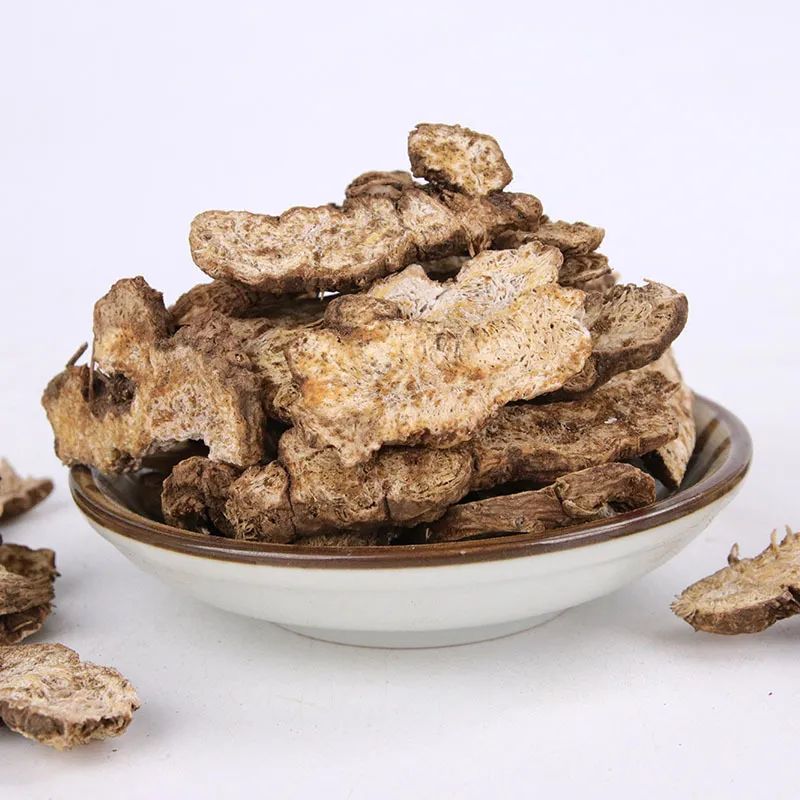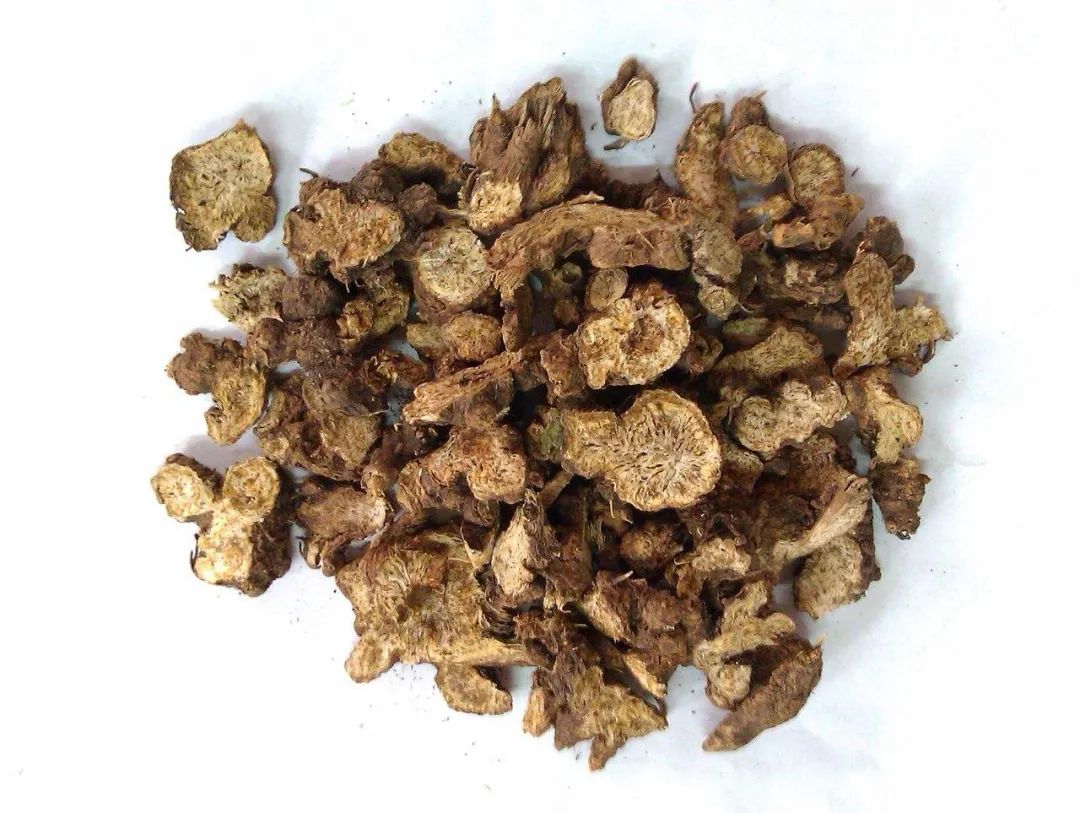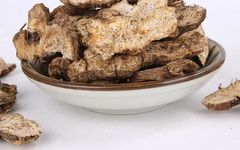Cang Zhu (Atractylodes)

Cang Zhu is derived from the dried rhizomes of the Asteraceae family plants, either Atractylodes lancea (Thunb.) DC. or Atractylodes chinensis (DC.) Koidz.
It is harvested in spring and autumn, cleaned of soil, sun-dried, and the fibrous roots are removed.
Classical Texts

Shen Nong Ben Cao Jing states: “Used in decoction, long-term consumption lightens the body, prolongs life, and prevents hunger.”
Shi Jian Ben Cao: “Cang Zhu wine treats various wind-damp sores and heaviness in the legs. Use 30 jin of Cang Zhu, wash and crush, soak in three dou of flowing water for twenty days. Remove the stems, soak the flour in the juice, as per home-brewed wine methods. Once the wine is ready, drink as desired.”
Zhen Zhu Nang records that it can “strengthen the stomach and calm the spleen; it can eliminate all damp swellings.”
Ben Cao Gang Mu states: “Dispels wind, eliminates dampness, and relieves depression. Juice brewed into wine treats all wind-damp pain in muscles and bones.”
Identification Points
(1) Irregularly bead-like, nodular cylindrical or lump-like, with slices appearing irregularly round or thick strips. (2) Surface is gray-brown or black-brown, with wrinkles, transverse grooves, and residual fibrous roots, with the top having stem marks or residual stem bases. (3) Firm or somewhat loose texture, with a cross-section that is yellow-white or gray-white, scattered with numerous orange-yellow, brown-red, or yellow-brown oil spots; some may reveal white needle-like crystals upon prolonged exposure. (4) Aroma is distinctive with a slightly sweet, spicy, and bitter taste. Traditional experience suggests that larger, firmer pieces with more red spots on the cross-section and a strong aroma are of higher quality.
Consumption Guidelines
Traditional Chinese Medicine (TCM) considers Cang Zhu to have a spicy and bitter flavor, and a warm nature; it enters the spleen, stomach, and liver meridians. It has the effects of drying dampness, strengthening the spleen, dispelling wind and cold, and improving vision. It is effective for damp obstruction in the middle jiao, abdominal distension, diarrhea, edema, leg weakness, wind-damp pain, wind-cold colds, night blindness, and eye dryness.
1. Cang Zhu with Job’s Tears Porridge
【Ingredients】15g Cang Zhu, 50g each of Job’s Tears and glutinous rice.
【Preparation】Wash Cang Zhu, wrap it in gauze, and place it in a pot with Job’s Tears and glutinous rice, adding an appropriate amount of water. Cook until the porridge is ready, then remove the herb bag and serve.
【Function】Strengthens the spleen and dispels dampness. Suitable for spleen deficiency with dampness obstructing ovulation bleeding, symptoms include slight vaginal bleeding during ovulation, excessive white discharge, chest tightness, poor appetite, and discomfort in bowel movements.
2. Cang Zhu and Winter Melon Soup
【Ingredients】15g Cang Zhu, 15g Ze Xie (Alisma), 250g winter melon, 500g lean pork, slices of ginger, and salt to taste.
【Preparation】Wash Cang Zhu and Ze Xie, clean and cut winter melon and pork into pieces. Boil water in a pot, add pork to blanch, then add Cang Zhu, Ze Xie, winter melon, pork, and ginger slices into the pot, add appropriate water, bring to a boil, then simmer for 1 hour, season to taste.
【Function】Aids in weight loss and promotes health.
3. Cang Zhu and Black Sesame Porridge
【Ingredients】15g Cang Zhu, 30g each of black sesame and walnut, 60g rice.
【Preparation】Wrap Cang Zhu in gauze, crush black sesame and walnut. Combine with rice in a clay pot, add appropriate water, and cook over low heat until the rice is soft and the porridge is thick. Remove the herb bag and consume on an empty stomach.
【Usage】Once daily.
【Function】This formula is suitable for night blindness and can also be used for blurred vision and dry eyes.
4. Pork Stomach Stewed with Cang Zhu
【Ingredients】1 pork stomach, 30g each of Cang Zhu and Chen Pi (dried tangerine peel).
【Preparation】Clean the pork stomach inside and out, wrap Cang Zhu and Chen Pi in gauze and place inside the stomach, tie tightly with string, add appropriate water, and simmer over low heat until cooked. Remove the herb bag and consume the stomach and broth while hot, finishing within 2 days.
【Function】Strengthens the spleen and stomach, aids digestion. Suitable for chronic gastritis, ulcer disease, and gastric prolapse with symptoms of abdominal distension, belching, nausea, and poor appetite.
5. Cang Zhu and Pig Liver Porridge
【Ingredients】100g pig liver, 9g Cang Zhu, 150g millet.
【Preparation】Dry Cang Zhu and grind into powder, slice the pig liver and wrap the powder inside, tie with string, and cook with millet and appropriate water in a clay pot until done.
【Function】Nourishes the liver and improves vision. Suitable for patients who stay up late and experience blurred vision.
6. Cang Zhu Lamb Pot
【Ingredients】500g lamb (fat and lean), 100g lamb bones, 50g Job’s Tears, 25g Fu Ling (Poria), 10g Cang Zhu, 500g white radish; 5g green onion, 5g ginger, 5g Sichuan pepper, 1g white pepper, 2g salt, 5g cooking wine.
【Preparation】Cut lamb and white radish into pieces, slice ginger, and chop green onion. Blanch lamb and bones in boiling water to remove the blood smell, rinse in clean water, then place in a clay pot with ginger slices, Cang Zhu, Sichuan pepper, Fu Ling, Job’s Tears, and white radish. Bring to a boil over high heat, add salt, white pepper, and cooking wine, then simmer for about 60 minutes, season to taste.
【Function】This formula has the effects of dispelling wind, eliminating dampness, scattering cold, and strengthening the spleen and stomach.
Consumption Contraindications
Should be avoided by those with yin deficiency and internal heat, and those with qi deficiency and excessive sweating.
According to Ben Cao Zheng: “Those with internal heat and yin deficiency, and those with excessive sweating should avoid it.”
According to Yao Xing Lun: “Avoid peaches, plums, sparrow meat, cabbage, and blue fish.”
According to Yi Xue Ru Men: “Those with blood deficiency and weakness, and those with emotional distress should use with caution. Misuse can deplete qi and blood, dry body fluids, and exacerbate internal heat and discomfort.”
According to Shen Nong Ben Cao Jing Shu: “For diseases related to yin deficiency, blood deficiency, insufficient essence, internal heat, bone steaming, dry mouth and lips, coughing with phlegm, vomiting blood, nosebleeds, throat obstruction, constipation, and those with liver and kidney qi movement should not consume.”
Special Statement
Non-clinical practitioners should not self-medicate to avoid adverse consequences. Patients must use under the guidance of a clinical physician.
-END-
Image materials sourced from the internet; if there are copyright issues, please contact this account for timely deletion.
Purchase channels
National Xinhua Bookstore
Professional medical bookstores
Major websites like JD, Dangdang, etc.


